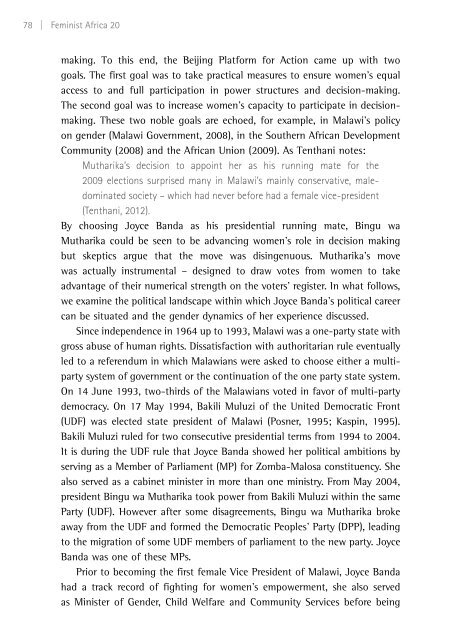Create successful ePaper yourself
Turn your PDF publications into a flip-book with our unique Google optimized e-Paper software.
78 | Feminist Africa 20<br />
making. To this end, the Beijing Platform for Action came up with two<br />
goals. The first goal was to take practical measures to ensure women’s equal<br />
access to <strong>and</strong> full participation in power structures <strong>and</strong> decision-making.<br />
The second goal was to increase women’s capacity to participate in decisionmaking.<br />
These two noble goals are echoed, for example, in Malawi’s policy<br />
on gender (Malawi Government, 2008), in the Southern African Development<br />
Community (2008) <strong>and</strong> the African Union (2009). As Tenthani notes:<br />
Mutharika’s decision to appoint her as his running mate for the<br />
2009 elections surprised many in Malawi’s mainly conservative, maledominated<br />
society – which had never before had a female vice-president<br />
(Tenthani, 2012).<br />
By choosing Joyce B<strong>and</strong>a as his presidential running mate, Bingu wa<br />
Mutharika could be seen to be advancing women’s role in decision making<br />
but skeptics argue that the move was disingenuous. Mutharika’s move<br />
was actually instrumental – designed to draw votes from women to take<br />
advantage of their numerical strength on the voters’ register. In what follows,<br />
we examine the political l<strong>and</strong>scape within which Joyce B<strong>and</strong>a’s political career<br />
can be situated <strong>and</strong> the gender dynamics of her experience discussed.<br />
Since independence in 1964 up to 1993, Malawi was a one-party state with<br />
gross abuse of human rights. Dissatisfaction with authoritarian rule eventually<br />
led to a referendum in which Malawians were asked to choose either a multiparty<br />
system of government or the continuation of the one party state system.<br />
On 14 June 1993, two-thirds of the Malawians voted in favor of multi-party<br />
democracy. On 17 May 1994, Bakili Muluzi of the United Democratic Front<br />
(UDF) was elected state president of Malawi (Posner, 1995; Kaspin, 1995).<br />
Bakili Muluzi ruled for two consecutive presidential terms from 1994 to 2004.<br />
It is during the UDF rule that Joyce B<strong>and</strong>a showed her political ambitions by<br />
serving as a Member of Parliament (MP) for Zomba-Malosa constituency. She<br />
also served as a cabinet minister in more than one ministry. From May 2004,<br />
president Bingu wa Mutharika took power from Bakili Muluzi within the same<br />
Party (UDF). However after some disagreements, Bingu wa Mutharika broke<br />
away from the UDF <strong>and</strong> formed the Democratic Peoples’ Party (DPP), leading<br />
to the migration of some UDF members of parliament to the new party. Joyce<br />
B<strong>and</strong>a was one of these MPs.<br />
Prior to becoming the first female Vice President of Malawi, Joyce B<strong>and</strong>a<br />
had a track record of fighting for women’s empowerment, she also served<br />
as Minister of Gender, Child Welfare <strong>and</strong> Community Services before being


